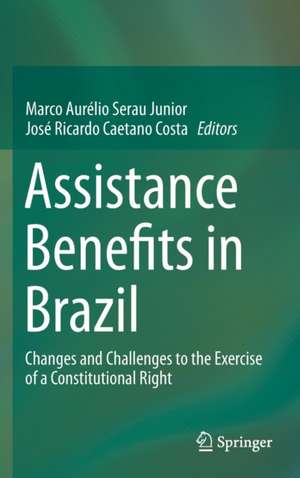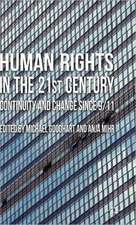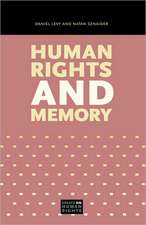Assistance Benefits in Brazil: Changes and Challenges to the Exercise of a Constitutional Right
Editat de Marco Aurélio Serau Junior, José Ricardo Caetano Costaen Limba Engleză Hardback – 23 mar 2016
| Toate formatele și edițiile | Preț | Express |
|---|---|---|
| Paperback (1) | 573.60 lei 6-8 săpt. | |
| Springer International Publishing – 24 apr 2018 | 573.60 lei 6-8 săpt. | |
| Hardback (1) | 641.85 lei 6-8 săpt. | |
| Springer International Publishing – 23 mar 2016 | 641.85 lei 6-8 săpt. |
Preț: 641.85 lei
Preț vechi: 755.13 lei
-15% Nou
Puncte Express: 963
Preț estimativ în valută:
122.85€ • 127.77$ • 102.95£
122.85€ • 127.77$ • 102.95£
Carte tipărită la comandă
Livrare economică 13-27 martie
Preluare comenzi: 021 569.72.76
Specificații
ISBN-13: 9783319270449
ISBN-10: 3319270443
Pagini: 178
Ilustrații: XIX, 179 p. 1 illus.
Dimensiuni: 155 x 235 x 13 mm
Greutate: 0.46 kg
Ediția:1st ed. 2016
Editura: Springer International Publishing
Colecția Springer
Locul publicării:Cham, Switzerland
ISBN-10: 3319270443
Pagini: 178
Ilustrații: XIX, 179 p. 1 illus.
Dimensiuni: 155 x 235 x 13 mm
Greutate: 0.46 kg
Ediția:1st ed. 2016
Editura: Springer International Publishing
Colecția Springer
Locul publicării:Cham, Switzerland
Cuprins
Presentation.-Preface.-Introduction.-Part I: General Theory.-The limbo of social protection: between assistance and security.-A contribution to the study of social security for the disabled: work and efficiency under the capitalist way of production.-The influence of economic over legal argument on the implementation of right to social assistance.-Public policies, legal activism and social assistance.-Social assistance and long-term benefits: a reality to be improved.-The importance of social assistance in Constitution as social instrument.-Part II: Requirements for granting and procedural aspects.-Administrative procedures for granting of assistance benefits.-The right to have rights: social assistance rights that rise from legal activism.-Particularities of the res judicata in granting of assistance benefits.-Social justice and maintenance of assistance benefits as predicted in the Act 8.742/93 in case of death of the beneficiary.-Biopsychosocial investigation: the good example thatcomes from the Organic Law of Social Assistance.-Assistance Benefits and Security Benefits: differences and similarities.-The right of immigrants to long-term benefits: a matter of citizenship.-Part III: Funding aspects of Social Assistance. Social Assistance: a brief study on the basic and special social protection expenses in the cities of São Paulo and Belém.-Part IV: Criminal aspects.-Social assistance and the crime of administrative advocacy: a necessary interpretation.
Notă biografică
Marco Aurélio Serau Junior is a lawyer with a PhD in Human Rights from University of São Paulo, Brazil. His fields of research are social security, access to justice and critical examination of jurisprudence on social security.
José Ricardo Caetano Costa is a lawyer and a professor at the Law School of the Federal University of Rio Grande, Brazil. He has a PhD in Social Service from Pontifical Catholic University of Rio Grande do Sul, Brazil. His fields of research include social securities, public policies, social assistance and environment.
José Ricardo Caetano Costa is a lawyer and a professor at the Law School of the Federal University of Rio Grande, Brazil. He has a PhD in Social Service from Pontifical Catholic University of Rio Grande do Sul, Brazil. His fields of research include social securities, public policies, social assistance and environment.
Textul de pe ultima copertă
This edited book focuses on the most controversial aspects of assistance benefits as mandated by the Brazilian Constitution of 1988 - and the challenges that have merged since the approval, in 1993, of the Federal Act 8.742, also known as Organic Law of Social Assistance. This collection of essays allows the reader to understand some important changes in social assistance policies in Brazil in recent years, having the General Theory of Social Security and the Human Rights as references. The tensions between economic principles and affirmative policies for the less advantaged parts of the society are also covered, showing how different interpretations of key concepts - like need, poverty or family - may have an important role on the exercise of fundamental rights.
Caracteristici
Summarizes the recent advances in the Brazilian law on having social assistance as a fundamental right Offers multiple views of the challenges faced by the Brazilian Justice in its debates on extending social assistance Broadens understanding of the tensions between economic and legal arguments in the provision of assistance benefits















